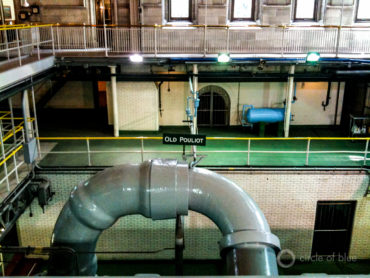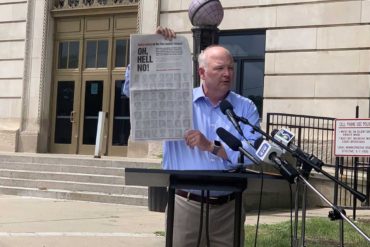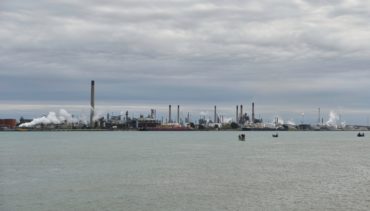-
 Charles Stewart Mott Foundation PartnershipEquity and Environmental JusticeIndigenous CommunitiesLatest NewsNews
Charles Stewart Mott Foundation PartnershipEquity and Environmental JusticeIndigenous CommunitiesLatest NewsNews“We Can’t Have Land Back Without Water Back”
-The director of Pueblo Action Alliance, an activist group, Julia Bernal is acutely aware that in arid areas like her home in the American Southwest, the fight for Indigenous rights starts with one crucial resource: water.
00 -

Michigan’s soggy summer evidence of a global climate reckoning
-Tens of thousands of homes were damaged when a series of severe storms hit southeast Michigan this summer. The worst of them dropped as much as seven inches into a sewer system built to drain no more than three inches in 24 hours.
-
 Algae BloomsCharles Stewart Mott Foundation PartnershipClimate ChangeDrinking WaterFish, Birds and AnimalsInvasive SpeciesLatest NewsNews
Algae BloomsCharles Stewart Mott Foundation PartnershipClimate ChangeDrinking WaterFish, Birds and AnimalsInvasive SpeciesLatest NewsNewsGreat Lakes in Peril: Invasives, pollution, climate change
-The Great Lakes in Peril: Invasives, Pollution, and Climate Change is a production of The Environment Report. Listen to the full documentary on Michigan Radio’s website.
-
 Charles Stewart Mott Foundation PartnershipForests and PlantsLatest NewsMichiganNewsPolicyPolitics, Policy, Environmental Justice
Charles Stewart Mott Foundation PartnershipForests and PlantsLatest NewsMichiganNewsPolicyPolitics, Policy, Environmental JusticeGroups mobilize to protect Upper Peninsula forest lands from mining, logging
-Hoping to seize upon the Biden administration’s pro-public lands agenda, a coalition of Michigan environmental groups is mounting a push to shield tens of thousands of acres in the western Upper Peninsula from future logging and other development.
-
 Charles Stewart Mott Foundation PartnershipFish, Birds and AnimalsLatest NewsMichiganNewsPolicyRecreational Hunting and Fishing
Charles Stewart Mott Foundation PartnershipFish, Birds and AnimalsLatest NewsMichiganNewsPolicyRecreational Hunting and FishingAfter federal rule change, Michigan resumes killing cormorants to save fish
-Under a new federal permit program, Michigan officials can kill up to 9,650 adult cormorants and destroy up to 1,400 nests in hopes of keeping fish out of the birds’ bellies and on Michigan anglers’ fishing hooks.
-
 Charles Stewart Mott Foundation PartnershipChicagoDrinking WaterEquity and Environmental JusticeFeature HomepageFeature-ChicagoFlintIllinoisInfrastructureLatest NewsLeadMichiganNews
Charles Stewart Mott Foundation PartnershipChicagoDrinking WaterEquity and Environmental JusticeFeature HomepageFeature-ChicagoFlintIllinoisInfrastructureLatest NewsLeadMichiganNewsSome Chicagoans Wary of Lead Pipe Replacement
-The response to Chicago’s lead pipe replacement project is a story playing out in neighborhoods across the country. Government public interest initiatives, even with the best of intentions and resources, are being curtailed by mistrust.
-
 Beaches, Boating, Paddle Sports and SailingCharles Stewart Mott Foundation PartnershipFeature HomepageLatest NewsMichiganNewsRecreation and TourismTourism
Beaches, Boating, Paddle Sports and SailingCharles Stewart Mott Foundation PartnershipFeature HomepageLatest NewsMichiganNewsRecreation and TourismTourismGreat Lakes surfers to Michigan: Don’t close beaches during rough waves
-Critics of the proposed order acknowledged the good intentions behind it but said it’s not the best way to improve water safety in Michigan.
-

How much should lawyers make in the Flint water crisis settlement?
-Residents and lawyers are arguing the merits of the proposed $641 million Flint water crisis settlement, with residents saying the fees lawyers are seeking that could amount to about 30 percent of the settlement is money that belongs to the victims and lawyers saying they’re simply asking for fair compensation.
-
 Beaches, Boating, Paddle Sports and SailingCharles Stewart Mott Foundation PartnershipLake MichiganLatest NewsMichiganNewsTourism
Beaches, Boating, Paddle Sports and SailingCharles Stewart Mott Foundation PartnershipLake MichiganLatest NewsMichiganNewsTourismPeople ignore drowning warnings, so Michigan may close Great Lakes beaches
-Red flags fly above the sand of Michigan’s Great Lakes beaches warning when the waves are dangerous, but that’s not always enough to stop swimmers from entering the risky water. It comes amid concerns that Great Lakes drownings will set a new record this year.
-
 Charles Stewart Mott Foundation PartnershipDrinking WaterForever Chemicals FeaturedGroundwater ContaminationLatest NewsNewsPFASResearch, Data and TechnologyScience, Technology, ResearchWater Quality and Restoration Efforts
Charles Stewart Mott Foundation PartnershipDrinking WaterForever Chemicals FeaturedGroundwater ContaminationLatest NewsNewsPFASResearch, Data and TechnologyScience, Technology, ResearchWater Quality and Restoration EffortsDealing with the soup of chemicals that can get into your drinking water
-Chemicals in water can mix. That’s where dealing with pollutants really falls short.

